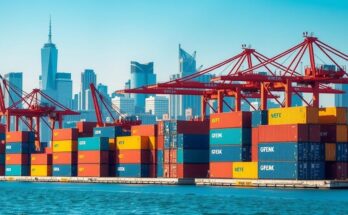In a striking move on April 2, the US unveiled its global reciprocal tariff plan, imposing a baseline tariff of 10 percent on all imports, with escalated rates as high as 50 percent. Countries like China, the EU, Japan, and India are particularly affected, facing tariffs of 34, 20, 24, and 26 percent respectively. This announcement led to a sharp fall in stock markets and a wave of global pessimism. Experts warn that these tariffs threaten the global free trade order established post-World War II.
The proposed tariffs violate the World Trade Organization’s most-favoured nation principle, fostering a skewed trading environment contrary to previously established agreements. Critics are questioning the legitimacy of the data behind the tariffs, suggesting it reflects trade deficits rather than fair economic analysis. Consequently, many international trading partners have voiced their discontent, indicating potential disruptions in supply chains, declining trade, and rising costs affecting businesses globally.
Reports suggest that if a global trade war ensues, the fallout could surpass the Great Depression’s consequences. Emerging markets are set to bear the brunt, with forecasts indicating an increased likelihood of global recession hitting 40 percent by 2025. The tariff strategy may derail recovery from inflation and escalate geopolitical tensions, augmenting the risk of economic downturn across nations.
Historically, economic bullying yields no long-term benefits. The US’s reciprocal tariffs echo the disastrous repercussions of the Smoot-Hawley Tariff Act, revealing a pattern of self-inflicted wounds. Past tariffs have resulted in significant losses for American sectors, like agriculture and manufacturing, and inflated consumer costs by billions annually, which has only emboldened nations like China in the face of renewed tariffs.
American households are beginning to grasp the looming costs, with predicted average tariffs potentially burdening them by up to $4,200 a year — a steep hike in living costs. Recent surveys indicate that many Americans believe the real price burdens lie with them and not just foreign entities, fuelling further discontent with ongoing tariff policies.
The history of economic bullying demonstrates a pattern where the aggressor ultimately suffers the greatest consequences. Only through adherence to multilateral trade rules can genuine cooperative outcomes be achieved. The intricacies of global supply chains highlight interdependence, and imposing tariffs risks disrupting this balance significantly. The US’s aggressive economic tactics may not only fail to resolve its issues but could also propel it further from the global consensus.
The US announced a reciprocal tariff plan that escalates trade tensions globally by imposing substantial tariffs on several nations. Critics warn this approach threatens the established free trade order and could lead to a serious global recession. Historical patterns of economic bullying show that such tactics often harm the initiator, while consumers face increased costs, illustrating the importance of multilateral trade relations for a stable global economy.
In summary, the US’s recent tariff imposition carries potentially catastrophic implications for the global trade landscape and domestic economy alike. Historical precedents reveal that economic bullying tends to backfire, harming not only targeted nations but the initiator as well. A multilateral approach and adherence to fair trade principles remain crucial for fostering global cooperation and avoiding future economic perils. The pathway to recovery and stability lies in collaboration rather than coercion.
Original Source: www.globaltimes.cn



